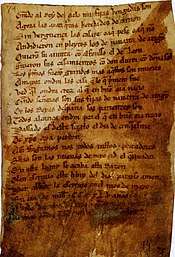Costa Rican Spanish
Costa Rican Spanish is the form of the Spanish language spoken in Costa Rica.
| Costa Rican Spanish | |
|---|---|
| Español costarricense | |
| Native to | Costa Rica |
| Region | Central American Spanish |
Native speakers | 4 million (2014)[1] 81,700 in Costa Rica (2014) |
Indo-European
| |
| Latin (Spanish alphabet) | |
| Official status | |
Official language in | |
| Regulated by | Academia Costarricense de la Lengua |
| Language codes | |
| ISO 639-1 | es |
| ISO 639-2 | spa[2] |
| ISO 639-3 | – |
| Glottolog | None |
| IETF | es-CR |
| Spanish language |
|---|
 Spanish around the 13th century |
| Overview |
| History |
|
| Grammar |
| Dialects |
| Dialectology |
| Interlanguages |
| Teaching |
Phonetics
The distinguishing characteristics of Costa Rican phonetics include the following:
- Assibilation of the "double-R" phoneme in some speakers (spelled ⟨r⟩ word-initially and ⟨rr⟩ intervocalically), especially in rural areas, resulting in a voiced alveolar sibilant (/z/)—thus ropa [ˈʐopa] ("clothing"), carro [ˈkaʐo] ("car"). Assibilation also affects the sequence /tr/, giving it a sound that is similar to [tʃ].[3][4]
- The double-R phoneme, as well as the single-R phoneme following /t/, can also be realized as a voiced retroflex approximant (/ɻ/) or voiced alveolar approximant (/ɹ/), with a sound similar to the /r/ of American English.[5] Thus ropa [ˈɹopa/ˈɻopa] ("clothing"), carro [ˈkaɹo/ˈkaɻo] ("car") & cuatro [ˈkwatɹo/ˈkwatɻo] ("four").
- Velarization of word-final /n/ (before a pause or a vowel), i.e. pronunciation as the velar nasal [ŋ].[6][7]
- Weakening of the /ʝ/ phoneme, i.e. a tendency to realize it as the approximant [ʝ̞] rather than as the fricative [ʝ]; in contact with /e/ or /i/ the phoneme can be lost.[8][9]
- The Costa Rican dialect adopted the voiceless alveolar affricate [t͡s] and the cluster [tl] (originally /tɬ/) represented by the respective digraphs <tz> and <tl> in loanwords of Nahuatl origin, for example quetzal and tlapalería [t͡ɬapaleˈɾia] ('hardware store'). Even words of Greek and Latin origin with <tl>, such as Atlántico and atleta, are pronounced with the affricate: [aˈtlãn̪t̪iko̞], [aˈtle̞t̪a] (compare [aðˈlãn̪t̪iko̞], [aðˈle̞t̪a] in Spain and other dialects in Hispanic America[10]).
Second person singular pronouns
Usted
Usted is the predominant second person singular pronoun in Costa Rican Spanish. Some speakers use only usted in addressing others, never vos or tú. Others use both usted and vos, according to the situation.
Vos
Vos is a second person singular pronoun used by many speakers in certain relationships of familiarity or informal contexts. Voseo is widely used between friends, family, people of the same age, etc. It is also commonly used in the university context between students. Some adults use vos to address children or juveniles, but other adults address everyone regardless of age or status with usted. Costa Ricans tend to use usted with foreigners.
Tú
Tú is rarely used in Costa Rican Spanish. However, due in part to the influence of Mexican television programming, Costa Ricans are familiar with tuteo, and some television viewers, especially children, have begun to use it in limited contexts.
Tiquismos
Costa Ricans are colloquially called "ticos" (based on the frequent use of the diminutive ending -ico following a /t/, as in momentico),[11] and thus colloquial expressions characteristic of Costa Rica are called tiquismos. Tiquismos and pachuquismos are used frequently in Costa Rica. The latter are expressions of popular street Spanish which can be considered vulgar and offensive if used in the wrong context. Many of these words, even when found in a standard Spanish dictionary, do not have the same meaning there as in Costa Rica. Learning colloquial expressions can be a guide to understanding the humor and character of the Costa Rican culture.[12][13]
Here are some examples of Costa Rican slang.
- Mae, ese chante es muy tuanis: "Dude that house is pretty cool".
- Esta panta no me cuadra porque me chima las piernas: "I don’t like these shorts because they chafe my legs".
- ¡Qué taco me dio esa vara!: "That thing really scared me!"
References
- Spanish → Costa Rica at Ethnologue (18th ed., 2015)
- "ISO 639-2 Language Code search". Library of Congress. Retrieved 21 September 2017.
- Canfield (1981:39)
- Lipski (1994:222)
- Lipski (1994:222)
- Canfield (1981:39)
- Lipski (1994:222)
- Canfield (1981:39)
- Lipski (1994:222)
- Navarro Tomás (2004)
- Canfield (1981:39)
- Howard, 2010
- Guide to Costa Rican Spanish (blog).
Bibliography
- Canfield, D. Lincoln (1981), Spanish Pronunciation in the Americas, Chicago: University of Chicago Press, ISBN 978-0-226-09262-1
- Howard, Christopher (2010), Christopher Howard's Official Guide to Costa Rican Spanish, Miami: Costa Rica Books, ISBN 1-881233-87-1
- Lipski, John M. (1994), Latin American Spanish, Longman, ISBN 978-0-582-08761-3
External links
- Jergas de habla hispana (Spanish dictionary specializing in slang and colloquial expressions, featuring all Spanish-speaking countries, including Costa Rica).
See also
- Latin American Spanish